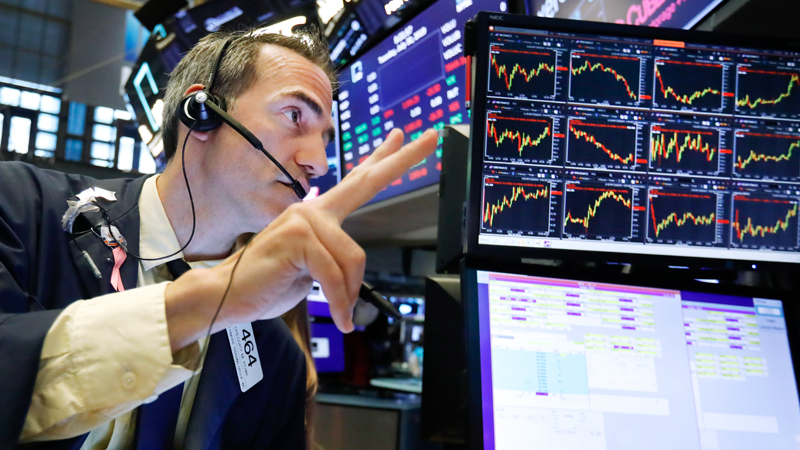Dow Jones plummets 800 points after bonds flash recession warning

Associated Press
The threat of a recession doesn’t seem so remote anymore for investors in financial markets.
The yield on the closely watched 10-year Treasury fell so low Wednesday that, for the first time since 2007, it briefly crossed a threshold that has correctly predicted many past recessions. Weak economic data from Germany and China added to recent signals of a global slowdown.
That spooked investors, who responded by dumping stocks, sending the Dow Jones Industrial Average into an 800-point skid, its biggest drop of the year. The S&P 500 index dropped nearly 3 percent as the market erased all of its gains from a rally the day before. Tech stocks and banks led the broad sell-off. Retailers came under especially heavy selling pressure after Macy’s issued a dismal earnings report and cut its full-year forecast.
Investors have been plowing money into the safety of U.S. government bonds for months amid growing anxiety that weakness in the global economy could sap growth in the U.S. Uncertainty about the outcome of the U.S. trade war with China has spurred a return of volatility to the stock market in August – the Dow has dropped more than 5 percent, and the S&P 500 is down more than 4 percent.
Economic data from two of the world’s biggest economies added to investors’ fears Wednesday. European markets fell after Germany’s economy contracted 0.1 percent in the spring due to the global trade war and troubles in the auto industry. In China, the world’s second-largest economy, growth in factory output, retail spending and investment weakened in July.
“The bad news for global economies is stacking up much faster than most economists thought, so trying to keep up is exhausting,” Kevin Giddis, head of fixed income capital markets at Raymond James, wrote in a report.
The S&P 500 fell 85.72 points, or 2.9 percent, to 2,840.60. The Dow sank 800.49 points, or 3 percent, to 25,479.42. The Nasdaq composite lost 242.42 points, or 3 percent, to 7,773.94. The Russell 2000 index of smaller company stocks slid 43.05 points, or 2.8 percent, to 1,467.52.
The losses come a day after stocks rallied when the Trump administration delayed tariffs on about $160 billion in Chinese goods that were set to take effect
Sept. 1.
President Donald Trump took to Twitter to defend his trade policy Wednesday, saying “we are winning big time, against China.” But many on Wall Street remain worried that the trade war between the world’s two largest economies may drag on through the 2020 U.S. election and cause more economic damage.
“We still see a substantial risk that the trade dispute will escalate further,” said Mark Haefele, global chief investment officer at investment bank UBS in a note to clients.
Trump also criticized the Federal Reserve for hamstringing the U.S. economy by raising rates “too much & too fast” last year and not reversing its policy aggressively enough – the Fed cut its key rate by a quarter point last month.
Traders tend to plow money into ultra-safe U.S. government bonds when they’re fearful of an economic slowdown, and that sends yields lower. When longer-term Treasurys fall below shorter-term ones, economists call it an “inverted yield curve.” An inverted curve suggests that bond investors expect growth to slow so much that the Federal Reserve will soon feel compelled to slash short-term rates to try to support the economy.
In short, it’s a sign of economic pessimism.
The yield on the 10-year Treasury has dropped from 2.02 percent July 31 to below 1.60 percent, and on Wednesday, it briefly fell below the two-year Treasury’s yield for the first time since 2007. Each of the past five times the two-year and 10-year Treasury yields have inverted, a recession has followed. The average amount of time is about 22 months, according to Raymond James’ Giddis. The indicator isn’t perfect, though, and has given false signals in the past.
After its early dip, the yield on the 10-year Treasury stood at 1.58 percent, even with the yield on the two-year. Meanwhile, the 30-year Treasury yield also hit a record low Wednesday.
 43
43
